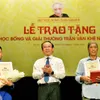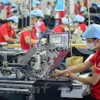Empowering women leaders - The key to advancing vocational education in the new era
According to statistics from the General Department of Vocational Education under the Ministry of Labor, Invalids, and Social Affairs in Vietnam, as of the end of last year, there were 1,905 vocational education institutions, comprising 410 colleges, 437 intermediate schools, and 1,058 vocational training centers. In 2022, these institutions enrolled around 2.45 million students, marking an increase of 500,000 compared to the previous year and the highest number in the past 5 years.
Apparently, vocational training in Vietnam has experienced significant growth in terms of quantity, but quality remains an area that needs improvement. In fact, according to the "Global Competitiveness Report" published by the World Economic Forum (WEF) in 2022, Vietnam ranks behind Singapore, Malaysia, Thailand, Indonesia, and the Philippines in terms of vocational training quality in the Southeast Asian region, and it stands at 80th out of 100 countries worldwide.
This requires timely initiatives from the government, one of which is the approval of the "Plan for the Network of Vocational Education Institutions for the 2021-2030 Period, with a vision to 2045." The government aims to restructure the vocational education network towards greater efficiency and uniform management in selected units.
By 2030, vocational schools must meet the workforce demands of developing countries with modern industries and high average incomes. By 2045, Vietnam's vocational schools need to offer training quality that places them at the forefront of Southeast Asia and some must reach the world's advanced levels and demonstrate superior competitive capabilities in certain fields.
To achieve these goals, the role of leadership in vocational education institutions is particularly crucial. In Vietnam, numerous vocational schools are led by capable women, often referred to as "female generals" - slender, humble women who play key roles in managing and guiding large institutions with thousands of students.
The significance of women's roles is increasingly recognized and appreciated by society. Empowering women is considered a key to achieving "equality and prosperity" - a concept emphasized in the joint initiative on empowering women introduced by UN Women and the UN Global Compact since 2010.
However, in reality, women still face tangible and intangible challenges that can hinder their career development every day. To cope with gender stereotypes and promote comprehensive women's leadership in all fields, especially in vocational education, Australia and Vietnam have partnered in organizing training courses through a Human Resource Development Partnership Program between Vietnam and Australia (Aus4Skills).
Aus4Skills is an Australian Government project aimed at supporting Vietnam in accessing and utilizing a skilled workforce that meets labour market demands, contributing to sustainable economic and social development. The program consists of five components implemented over five years from 2016, including Advancing Women in Leadership.
Recently, 24 Vietnamese women leaders and managers from colleges and vocational education partners participated in a short course under the framework of the Aus4Skills program. The course equipped them with adaptive leadership skills and effective responses to overcome invisible barriers and develop their potential. The training covered various topics, including gender equality, disability and social inclusion, and practical skills.
Additionally, various prominent issues were discussed during the workshop, especially those significant to women leaders, such as career development, work-life balance, and challenges and initiatives that support female leadership in male-dominant sectors.
Numerous ideas were introduced at the symposium held on 8th of July in Ho Chi Minh City, and are now being applied in projects at vocational colleges. All these efforts aim to promote the role of women leaders in vocational education, increase students' awareness of gender stereotypes, and provide guidance on implementing gender equality practices in the workplace.
Ms. Vu Thi Hai Van, Chair of Maritime College 1 Council and one of the 24 course participants, shared, "Leaderships is a mindset and every of our female teachers can inspire change. The course has encouraged me to create an even more supportive workplace for my female colleges where they can empower themselves and others.”
Ms Julie Hart, First Secretary (Development) at the Australian Embassy Vietnam, emphasized during the workshop, "Many of our participants have recognised the power of partnerships and networks in driving positive change. By establishing networks of women in your organisations, you are fostering a supportive environment where mentorship, knowledge sharing, and collaboration can thrive and contributing to a more inclusive and equitable society.”
The course "Fostering Women Leadership in vocational education and training and logistics” is an example of close collaboration between Australia and Vietnam, demonstrating their shared commitment to promoting gender equality, empowering women, and advancing the role of women leaders in vocational education.
Through Aus4Skills, Australia is working with Vietnam to build links between industry and vocational education and training providers to ensure graduates meet employer needs and improve capacity for academic leaders, trainers and management at partner institutions.
Tags:





